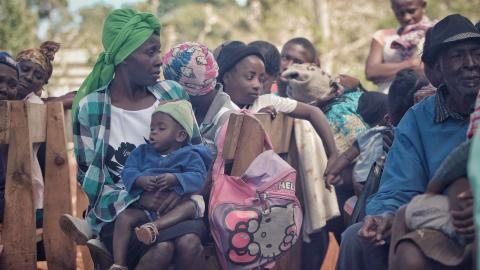
Civil society leaders say repeating the mistakes of the past will not solve Haiti’s sociopolitical crisis today. The following article was published in the September-October 2022 issue of NewsNotes.
On August 19, the Quixote Center, a social justice organization in Washington, DC, working for systemic change in Haiti, released a statement opposing military intervention in the long-suffering Caribbean country, as the sociopolitical crisis and calls for intervention, grow. The following is an excerpt.
… “Over the last two years, Haitian civil society organizations have been engaged in extensive dialogue about governance. The Commission in Search of a Haitian Solution to the Crisis grew out of this process.
“At the time the Commission launched its work in January of 2021, Jovenel Moïse was still president and ruling by decree. The international community, led by the United States government, continued to throw its weight behind Moïse, despite the deteriorating security situation, the Moïse government’s evident complicity in much of the violence, and his regime’s setting aside of constitutional rule.
“It is the international community’s utter neglect of democratic principles in propping up Moïse that led to the current crisis. In contrast, the Commission’s work has succeeded in furthering a civil society dialogue that cuts across historic ideological divides. Thus, the very thing Louis Almagro [secretary general of the Organization of American States] and others suggest can’t happen without international intervention, is happening now, and has been happening for at least 18 months!
“Haiti does not need a UN force to invade to create the space for dialogue. What is needed is for the international community to back off its unquestioning support for [Prime Minister Ariel] Henry so that the current government will engage honestly in the already existing dialogue.
“In addition, we note that Haiti’s last experience with military intervention, under MINUSTAH [the UN Mission to Stabilize Haiti], was a disaster. People are widely familiar with the UN force’s introduction of cholera in 2010, and the widespread sexual violence and exploitation that occurred as the result of the occupation.
“Often forgotten today, however, is that MINUSTAH forces engaged in other gross human rights violations. For example, over the course of 18 months, UN soldiers launched attacks on Port-au-Prince’s poorest neighborhoods, including a series of massive assaults on Cite Soleil in which dozens of civilians were killed.” …
“[T]he occupation only deepened the crisis of insecurity by further entrenching collaboration between economic and political elites, the police, and armed groups. There is no reason to believe a new UN military intervention would act any different.
“So, what can the international community do?
“First, the United States can step back from its unquestioning support for the de facto government of Ariel Henry. A Haitian-led solution is the only way that stability returns. And, the only way this can happen is if the United States changes course.
“Second, an agreement on governance has to be implemented, and insecurity could be a major obstacle. But the agreement on governance has to come first, then insecurity can be addressed through the mechanisms established.”...
“Thirdly, long-term insecurity must be addressed as a structural problem. Gangs are a symptom of multiple, cross cutting crises: Rapid urbanization, under-resourcing of public services including public education, and a lack of employment opportunities, leading to long-term extreme poverty.
“The international community has contributed greatly to these problems through years of mandated structural adjustment policies that have gutted the public sector in Haiti in exchange for debt servicing agreements. The international community should cancel much of Haiti’s international debt...” …
“Fourth, where the gangs operate, listen to the peace-makers. People in troubled communities like Cite Soleil, Martissant, and elsewhere want peace. They know the history of their communities. They know gang members and they understand what drives the problem. They know what has worked in their communities and what has not. Listen to them!”...
“Fifth, the United States and regional governments need to do more to reign in illegal gun sales to Haiti. Gun sales to Haiti are supposed to be highly restricted and monitored already, but the system is clearly broken. The United States must evaluate, fix, and enforce this system alongside officials from Haiti and the Dominican Republic.” …
“Recognizing the failures of past interventions, while promoting future ones, makes no sense. The international community must get on another track in Haiti; one that respects the initiative of Haitian civil society who are right now trying to build a more democratic future.”
Faith in action: Sign the petition to end U.S. expulsions of asylum-seekers to Haiti https://bit.ly/QuixotePetitionHaiti
Photo: People in Haiti. Photo by Zach Vessels on Unsplash
